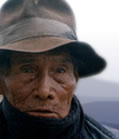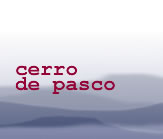THEMES IN THIS
TESTIMONY
Conflict

Education

Environment

Gender

Health

Livestock

Social Change

Social Relationships

Click on arrows
to find more
testimonies
featuring
these themes
|
|
Sex
|
female
|
|
|
Age
|
44
|
|
|
Occupation
|
herder
|
|
|
Location
|
San Antonio/Yauli
|
|
|
Date
|
1995
|
|
summary
Gregoria was born and bred in San Antonio (an annex of Yauli). Her own animals died from the pollution and her husband has taken to alcohol. She tries to make a living by grazing animals for the cooperative in order to pay for her children's education. Recently, these animals were stolen and so she lost her work there too. She doesn't know what she'll do now.
She talks about how the community land was divided up by the mine owners and how now, as a result of having little land and because of the contamination, young people are migrating to find work outside the community. She compares Cerro de Pasco to the new nationalised Centromin company and claims the latter is an improvement but only because "the gringos (North Americans who ran/owned the mines) were very bad".
When she was young, many women had little or no schooling and she believes the fact that they never hold positions of authority within the community won't change until they're better prepared educationally. She talks with anger about machista attitudes that disadvantage women. Lastly, she feels young people have changed, in their aspirations, their lack of respect for elders and their tendency to leave the community to find work. There is a sense that she feels bereaved and deserted by the exodus of young people. She’s had a hard life and clearly places her hope in her own children.
detailed breakdown
|
You will need a password from Panos to view the full
transcript of the interview. To apply for a password, click here.
Once you have a password, click here to go to the beginning
of the transcript. You can also click on any section of the
breakdown of content below and go straight to the
corresponding part of the transcript.
|
| Section 1 |
Her parents inherited land from ancestors. Fields were bigger, but some members of the community sold to landowners and mining companies and they divided them up.
|
| Section 2 |
Local fiestas (festivals, celebrations), and patron saint day. People trade at the same time.
Life easier in past: more land, more livestock. People no longer want to stay; they leave to study and work. “They go and no longer think about their homeland.”
Occupations = livestock and work in the nearby mines
|
| Section 3 |
Mines don't bring any benefits to the community, only to their workers.
She worked in the cooperative until those animals were stolen; husband used to work on land but the animals died from pollution so he became a bricklayer
|
| Section 4 |
Causes of illnesses (torniquera and septicaemia) seem to be lead poisoning, fumes, polluted pasture. Smelter has been belching fumes since she was a child
|
| Section 5 |
Humans also suffer illness: headaches, flu etc. She’s weary now she’s lost her animals; hopes others will help since “being a comunero means you have to give and receive”. Her husband can barely support them because people delay payment (later admits he’s alcoholic). Many of her relatives have gone to Pomacocha where the pollution is less.
|
| Section 6-7 |
Education: no reliable teachers in Pomacocha, so she came to Yauli (for her children’s schooling. She only studied until second grade primary school; grandmother said “that’s enough”, now we’ll pay for brother. Feels women should have chance to study as lots are heads of households or go to the city where they need qualifications. Now school’s obligatory for both sexes. When the law came in she was 12, and police frightened her grandmother saying the punishment for not sending children to school “could be 48 hours in goal”. If they hadn’t said that, she would not have got any education.
|
| Section 8 |
Own daughter dropped out of school because of illness (pollution-related?) then got pregnant; the father didn't take responsibility so community helped. Her partner has taken to drink, disrupted the other children’s schooling.
|
| Section 9 |
Men have more opportunities - for study, for work, for positions of authority.
“… men can do what they want and it doesn't matter…. if they get drunk, it's not seen as bad. A drunk woman's a lost woman. A single mother's disgraced all her life. The men have children all over the place.” Sad story of the effect of partner’s drunkenness on the family
|
| Section 10 |
Situation compounded by the theft of the cooperative’s animals. Others say president of the community didn’t have the right to take the job away if it was a genuine theft and he could see the tracks/evidence.
Mentions another livestock disease, maniota, from water contaminated by lead
|
| Section 11-12 |
Communities of Yauli fought with Cerro de Pasco to retrieve lands; much conflict; story of gringos taking a comunero’s sheep on to their land and then claiming damages
|
| Section 13 |
No longer forced off the land but pollution continues; if it wasn't for the fumes she would still have animals.
Aspirations for her children: teacher, doctor, mechanic, musician, artist but “my oldest one [will never make it] because she doesn't know how to read”.
|
| Section 14 |
Younger generation have lost respect for others (but earlier says they are also “more awake”, “livelier”).
Polluted rivers mean fish no longer available
|
| Section 15 |
New mayor is bringing changes - trout farm, free medicines, telephone, radio - whereas central government just hands out second-hand shoes to schools, and fails to do anything about contamination
|
| Section 16 |
Economic situation: petty trading at the fiestas isn’t so good because people aren’t paid on time, and population is dwindling because of lack of land, food |
|


